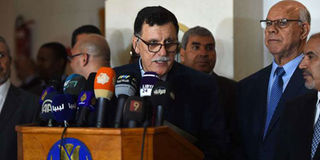UN talks to discuss ‘unified’ army in war-torn Libya

Libyan Prime Minister Fayez al-Sarraj speaks during a press conference following his meeting with representatives of Libyan political parties on July 17, 2016 in Tunis. The UN hosted a second day of talks on Libya with the aim of creating a "unified" army in a country wracked by internal divisions and a jihadist threat. PHOTO | AFP
What you need to know:
- The Government of National Accord faces a fearsome set of military, economic and political challenges in a country where rival militias have vied for power since the overthrow of veteran dictator Muammar Gaddafi in 2011.
- Forces loyal to the unity government are fighting to drive the Islamic State group out of the jihadists’ coastal stronghold of Sirte.
TUNIS
The UN is set to host a second day of talks on Libya with the aim of creating a “unified” army in a country wracked by internal divisions and a jihadist threat.
The organisation brokered a power-sharing deal last year to form a Government of National Accord (GNA), but the body is still struggling to assert its authority. “All Libya’s problems today are tied up to the security issue,” said Martin Kobler, head of the UN’s support mission in the country, after a first day of talks in the Tunisian capital on Saturday.
The goal of the discussions was to create “a unified Libyan army under the command of the presidential council,” he said, according to an Arabic translation of his remarks.
“Libya cannot be united as long as it has several armies,” he said.
HUMANITARIAN ISSUES
The first day’s meeting also touched on humanitarian issues. The GNA faces a fearsome set of military, economic and political challenges in a country where rival militias have vied for power since the overthrow of veteran dictator Muammar Gaddafi in 2011.
Forces loyal to the unity government are fighting to drive the Islamic State group out of the jihadists’ coastal stronghold of Sirte.
The two-month battle has killed around 250 pro-GNA fighters and wounded more than 1,400, according to medical sources at the unity forces’ command centre.
The GNA arrived in the capital three months ago, but it has not been endorsed by Libya’s elected parliament.





